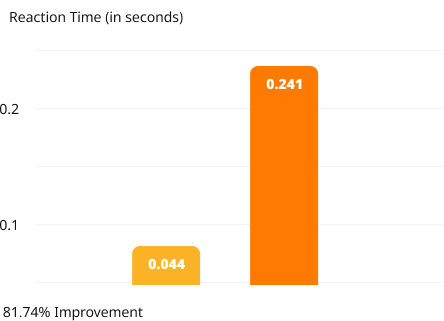The Scientific Research Behind Effectivate
When Science and Innovation Meet Technology
of research
Research
In a world where life expectancy is rising, maintaining mental sharpness and optimal cognitive function has become a paramount task. Effectivate leads the field of cognitive training, drawing on cutting-edge research and continuous development of advanced solutions for preserving brain health.
Since its establishment, Effectivate has invested continuously in research and development, in collaboration with leading academic institutions and medical centers. Our approach is evidence-based, tracking developments in cognitive science and principles of neuroplasticity.
Our Collaborations


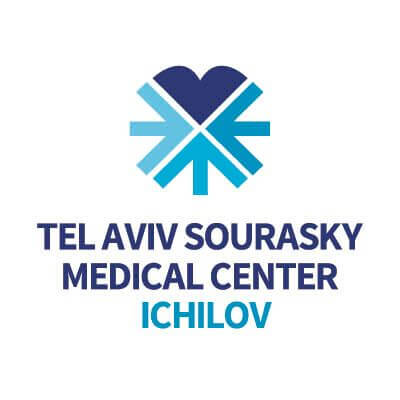

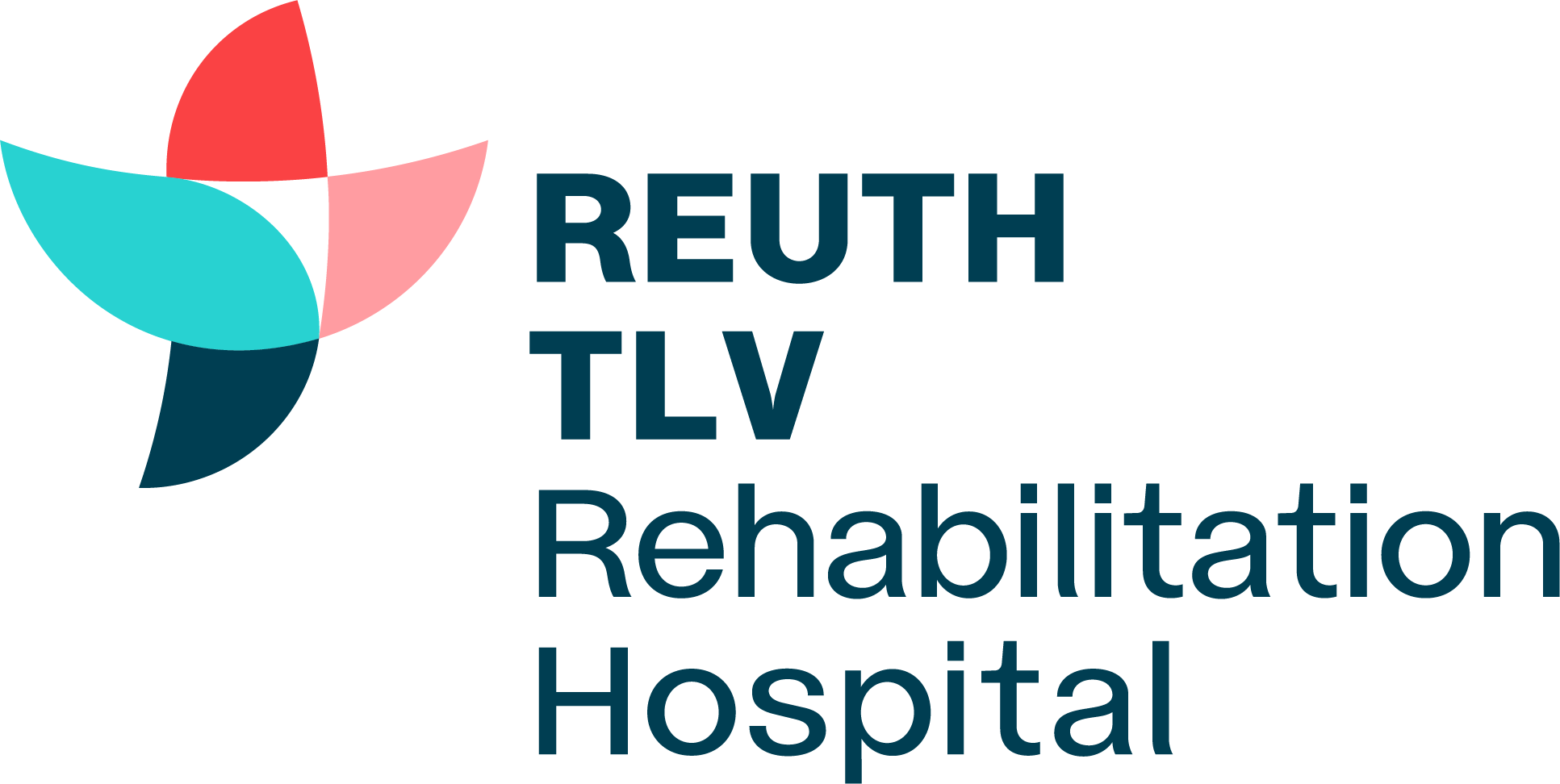
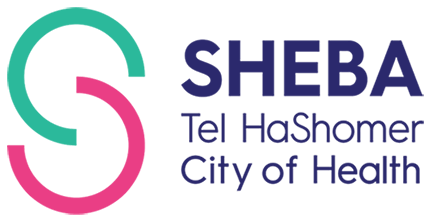
Breakthrough Research Findings: Cognitive Training Prevents Decline
Study led by Prof. Michal Lavidor - Bar-Ilan University
The study examined the impact of cognitive training using the Effectivate platform on verbal memory functions. Participants were divided into three groups and assessed on memory performance at three time points: at the beginning of the study, at its conclusion, and three months later.
1. Study Groups
- “Boost” Group (Circles):
Trained with Effectivate and received targeted brain stimulation (tDCS) designed to enhance learning. - “Training Only” Group (Squares):
Trained with Effectivate without brain stimulation. - Control Group (Triangles):
Did not undergo cognitive training with Effectivate and instead attended general health-related lectures.
Research Findings
Without Cognitive Training, Decline Occurs – The most important message emerging from the study is the dramatic difference between participants who trained and those who did not. The graph clearly shows that participants in the control group experienced a decline in memory performance over time (red arrow).
The clear conclusion: when the brain is not trained, cognitive performance naturally tends to decline.
Cognitive Training Preserves Stability – “Training Only” Group (Effectivate without stimulation):
Participants who trained with Effectivate maintained stable memory performance throughout the entire follow-up period (green line).
In other words, the training prevented the decline observed in the control group. By the end of the study, these participants performed better than those who did not train at all (blue arrow).
Adding a “Boost” Leads to Improvement – “Boost” Group (Effectivate with brain stimulation):
Participants in this group showed significant improvement in performance throughout the study period. The brain stimulation acted as an “accelerator,” strengthening the effect of the training and taking participants beyond maintenance into a phase of genuine improvement.
It's Proven: Far Transfer Occurs
Research Led by Prof. Boaz Ben-David - Reichman University
Professor Boaz Ben-David, head of the Communication and Neuropsychology Laboratory at Reichman University, conducted research examining the effect of Effectivate’s cognitive training on “far transfer.” That is, creating improvement in a task that was not trained within the training framework. In a randomized controlled study, the research team examined among 20 adults whether their auditory discrimination ability improved after 6 weeks of training in Effectivate with visual exercises only, without auditory training. The results were compared to a control group of 20 additional adults.
The research results were found to be significant: over the 6 weeks of the experiment, the auditory discrimination ability of the experimental group improved much more than that of the control group. Additionally, it was found that there were two time points at which the gap between the groups was particularly large: 250 milliseconds after the start of listening to the word, and 1250 milliseconds after the start of listening. The first time point suggests improvement in the attentional process of distinguishing the word from background noise; while the second time point suggests improvement in the stage of making the decision about what the spoken word is.
The researchers’ conclusion is that the findings indicate that far transfer occurred, and point to two possible processes on which training in Effectivate had an effect and enabled this transfer: the attentional process and the decision-making process. The potential impact on daily life is enormous: a quarter of a second is what can make the difference between missing words and successfully staying engaged in a conversation over time
Effectivate's Research Activity
Beyond foundational research, Effectivate continues to lead innovative research in the field, in collaboration with leading institutions in the Israeli healthcare system and academia. Current research focuses on developing advanced technologies for early diagnosis of cognitive decline and examining the combined effects of different trainings on brain health:
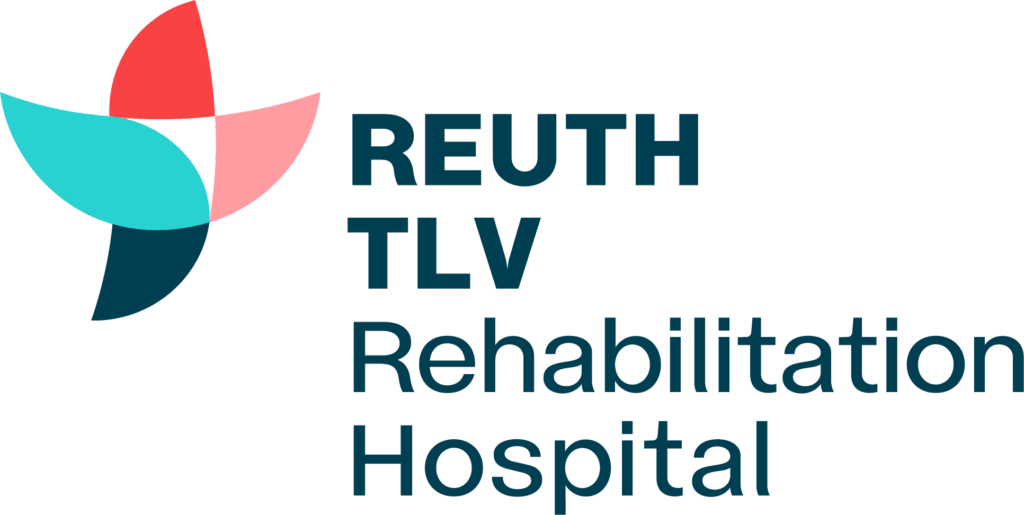
Institution Name: Reuth Rehabilitation Hospital, led by Dr. Racheli Dankner
Building a machine learning model to alert about patterns consistent with mild cognitive impairment (MCI). The collaboration with Reuth Rehabilitation Hospital is designed to create a dataset of healthy people and people with cognitive deterioration at different levels of severity, and to train a system on it to detect patterns consistent with cognitive decline, which will provide an alert about suspected deterioration among healthy people. For this purpose we defined a target of 100 people with cognitive decline that is not dementia, who will undergo a training program in the Effectivate system for 6 weeks accompanied by clinicians.

The Hebrew University, research led by Prof. Mor Nahum
Examining the effectiveness of combined training – metacognitive goal-setting intervention and computerized cognitive training – in improving cognitive, mental, and functional measures among elderly people with depressive symptoms.

Sheba Hospital, led by Dr. Avigail Goshen.
Research with the Longevity center at Sheba. The Longevity clinic research is an encompassing study examining the impact of various factors on health and longevity. One of the tools whose impact is being tested in the research is training on the Effectivate platform, and here the research has several purposes:
- Validating the usability of Effectivate’s assessment tests in predicting cognitive function as measured by the NeuroTrax and MoCA test batteries.
- Exploring the relationship between the degree of training persistence and cognitive preservation/improvement.
- Exploring differences related to age, gender, education, and initial cognitive status in the effectiveness of the training protocol.
- Examining the long-term effects of Effectivate’s cognitive training on the cognitive and physical performance of trainees.
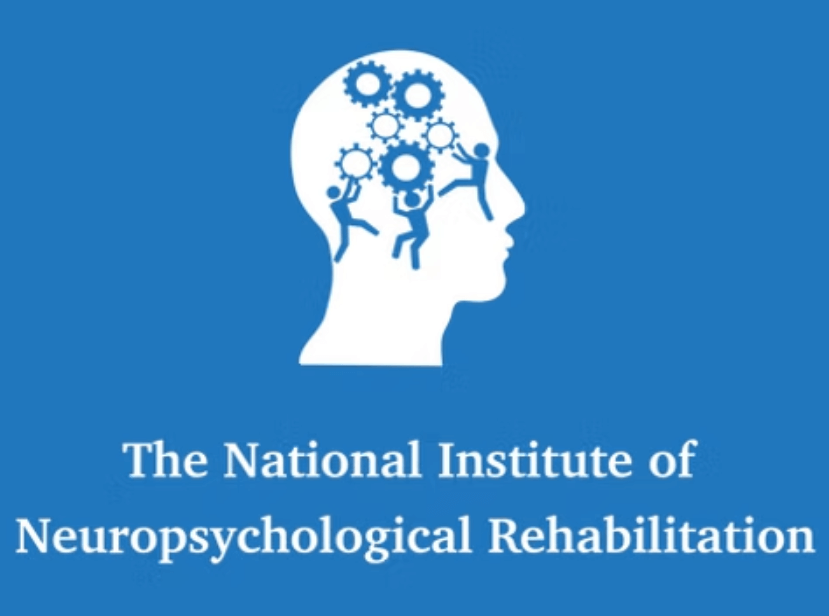
The National Institute of Neuropsychological Rehabilitation, led by prof. Ayala Bloch
A study conducted at the National Institute for Neuropsychological Rehabilitation examines the impact of surgical menopause on neuropsychological functioning among women who are BRCA gene carriers. The study combines computerized cognitive measures with self-report assessments and evaluates the effectiveness of personalized cognitive training in preserving and improving cognitive functions over time.
The Scientific Basis Behind Effectivate
Effectivate’s platform was developed based on comprehensive foundational research, providing solid scientific support for our training approaches. The following studies form part of the scientific infrastructure according to which we built our cognitive training:
Maintaining Speed Advantage – Even After a Decade
Rebok and colleagues published in 2014 a longitudinal study of about 2,800 community-dwelling adults aged 65 to 90. Participants in one group focused on improving reasoning, while another group focused on improving processing speed, and the latter showed improvement in the trained abilities that was maintained even after 10 years. Additionally, adults who trained in speed improvement exercises maintained a higher level of daily functioning, also even after 10 years.
Rebok, George W., et al. “Ten‐year effects of the advanced cognitive training for independent and vital elderly cognitive training trial on cognition and everyday functioning in older adults.” Journal of the American Geriatrics Society 62.1 (2014): 16-24
Computerized Cognitive Training Contributes to Healthy Aging
A 2020 meta-analysis by Bonnechère examined whether computerized cognitive training is really an effective solution for promoting healthy aging. For this purpose, data were collected from 16 controlled studies (1,543 participants) that examined the results of using commercial computerized cognitive training software among people over age 60 without cognitive impairment. Significant improvement was found in processing speed, working memory, executive functions, and verbal memory.
Bonnechère, Bruno, Christelle Langley, and Barbara Jacquelyn Sahakian. “The use of commercial computerised cognitive games in older adults: a meta-analysis.” Scientific reports 10.1 (2020): 1-14
The Effectiveness of Computerized Training Is Not Dependent on Technological Knowledge
A 2012 systematic review article by Kueider examined the effectiveness of computerized cognitive training in healthy adults. 38 studies were included in the review article, and were divided into three groups according to the type of training performed: traditional cognitive practice with paper and pencil, training in computerized software, and video games. The findings show that computerized cognitive training is as effective as traditional practice with paper and pencil and that a computerized training program is a more efficient and intensive alternative. Additionally, most studies reported that older adults did not need to have technological knowledge to successfully perform the training and benefit from it.
Kueider et al. “Computerized cognitive training with older adults: a systematic review.” PloS one 7.7 (2012): e40588
Reading and Playing Cards Don’t Bring the Same Results
A 2014 systematic review and meta-analysis article by Kelly examined the effect of computerized cognitive training in healthy adults. 31 studies were screened so that the article included nearly 2,000 participants in different cognitive training groups and 400 participants in control groups, such as reading or playing cards. Compared to an active control group, computerized cognitive training improved working memory, processing speed, and general cognitive function. Compared to a control group that did no activity, computerized cognitive training improved memory measures such as name and face recall, immediate word recall, creating new associations, as well as subjective cognitive function.
Kelly et al. “The impact of exercise on the cognitive functioning of healthy older adults: a systematic review and meta-analysis.” Ageing research reviews 16 (2014):12-31.
Want Brain Health? Challenge the Brain and Move the Body
A 2014 review article by Bamidis explains why maintaining a healthy brain is critical for quality of life and independence in older age. Challenging the aging brain through cognitive training and physical training have been proven effective against cognitive decline and age-related diseases. This article summarizes recent findings regarding brain mechanisms related to brain changes in the third age and emphasizes the importance of optimal functioning of brain networks throughout life and recommends training that includes cognitive and physical exercises.
Bamidis et al. “A review of physical and cognitive interventions in aging.” Neuroscience & Biobehavioral Reviews 44 (2014): 206-220
The Scientific Foundation of Effectivate
Effectivate’s advanced cognitive training is grounded in up-to-date research in neuroscience and cognitive science, and is designed to slow, and even help prevent the natural cognitive decline associated with aging.
The program focuses on cognitive abilities that tend to weaken with age, including working memory, associative connections, and attentional functions. Effectivate’s effectiveness stems from the application of neuroplasticity principles, which enable the brain to change, learn, and strengthen even in later life.
The training system dynamically adapts to the user’s level in real time, presenting precisely calibrated cognitive challenges that encourage effort, learning, and meaningful growth. This approach supports the development of cognitive reserve, a pool of brain resources and processes that helps maintain mental sharpness, learning, and memory over the years.
Consistency in Training Leads to Results
Effectivate users demonstrated significant improvement in working memory over 10 months of brain and memory training.
Effectivate users demonstrated significant improvement in face recognition over 10 months of brain and memory training
Effectivate users demonstrated improved attention focus over 10 months of brain and memory training.
Effectivate users demonstrated improved reaction time over 10 months of brain and memory training.
Effectivate users demonstrated improved attention management over 10 months of brain and memory training.
Success Stories
a task examining non-verbal visual memory.
71.4% Reduction in Errors of Incorrect Connection Between Shape and Location
David Y., now 65, improved his spatial attention by 71.4%.
This task includes two stages: in the first stage, one flower or three flowers are displayed on the screen for an exposure time of one second or three seconds (one second per flower). In the second stage, the flowers disappear and two flowers appear at the bottom of the screen, when one of them appeared in the previous screen and the other did not. The user must choose the original flower and drag it to the location where it was displayed. The measure here was the percentage of errors resulting from incorrect connection between the shape and location. This represents the quality of the connection between the location and the object.
a task examining non-verbal visual memory.
54.6% Improvement in Identifying the Correct Location
David P., now 71, improved his spatial memory ability.
This task includes two stages: in the first stage, one flower or three flowers are displayed on the screen for an exposure time of one second or three seconds (one second per flower). In the second stage, the flowers disappear and two flowers appear at the bottom of the screen, when one of them appeared in the previous screen and the other did not. The user must choose the original flower and drag it to the location where it was displayed. The measure here was the percentage of correct answers in identifying the location.
Temporal Order Judgment.
225% Improvement in Success Rate in the Temporal Order Judgement Task (which tests processing speed)
Smadar S., now 65, improved her processing speed by 225%.
In this task, two stars are displayed in two frames appearing side by side on the screen. Each star has a different color (yellow and blue) and they appear in a fixed frame. The stars appear one after the other with a very short time difference between them (50 milliseconds). The user must press a button to indicate which of the stars appeared first (when the right and left stars have equal probability of appearing first). The measure here was the percentage of correct answers.
Backwards Digit Span
33% Improvement in Processing Ability
Michaela S., 71, improved her working memory by 33% in the backwards digit span task.
a computerized task for examining verbal short-term memory and working memory. In the task, a list of digits is presented one by one, and the user must reproduce it in reverse order. The measure here was the maximum number of digits the participant successfully reproduced.
Michaela went from 6 digits that she successfully remembered to 8 – an increase of 33%.
60.2% Improvement in Response Speed
Nava K., now 68, reduced her response speed by 60.2%.
In this task, two stars are displayed in two frames appearing side by side on the screen. Each star has a different color (yellow and blue) and they appear in a fixed frame. The stars appear one after the other with a time difference of 200 milliseconds between them. The user must press a button and answer which of the stars appeared first (when the right and left stars have equal probability of appearing first). The measure here was the response speed in the correct moves (in seconds).
The Task: Flanker -- a task for examining executive attention.
81.74% Improvement in Executive Attention
Merav N., 57. Improved executive attention by 81.74%.
The task involves displaying five arrows when the user is required to respond according to the direction the middle arrow is pointing (right or left). The other four arrows, two on each side of the middle arrow, can point to the same side (=congruent condition) or to the opposite side (=incongruent side). The measure here was the congruency effect, which is the difference between the response time in the difficult condition (incongruent) and the easy condition (congruent).
For this trainee, the difference decreased from 0.241 seconds to 0.044 seconds.
